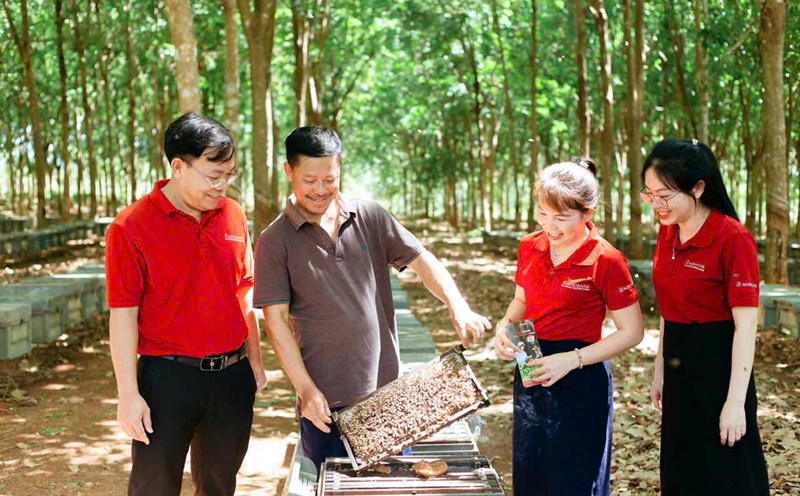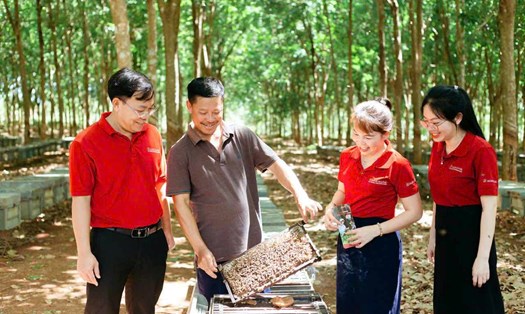The seminar took place in the context of the banking sector proactively implementing the plan to innovate the work of law making and enforcement to meet the requirements of national development in the new era in the spirit of Resolution 66-NQ/TW of the Politburo and Resolution 140/NQ-CP of the Government.
The banking industry recorded many positive results in green growth
Mr. Nguyen Quoc Hung - Vice President and General Secretary of the Vietnam Banking Association - said that in recent times, the Party and Government of Vietnam have paid special attention to the issue of green growth. In 2021, the Prime Minister approved the National Strategy on Green Growth for the period 2021 - 2030 and vision to 2050. The Government has issued a legal framework, a green financial market development strategy and a number of decrees for implementation. Recently, on July 4, 2025, the Prime Minister issued Decision No. 21/2025/QD-TTg stipulating environmental criteria and the confirmation of investment projects in the green classification list.
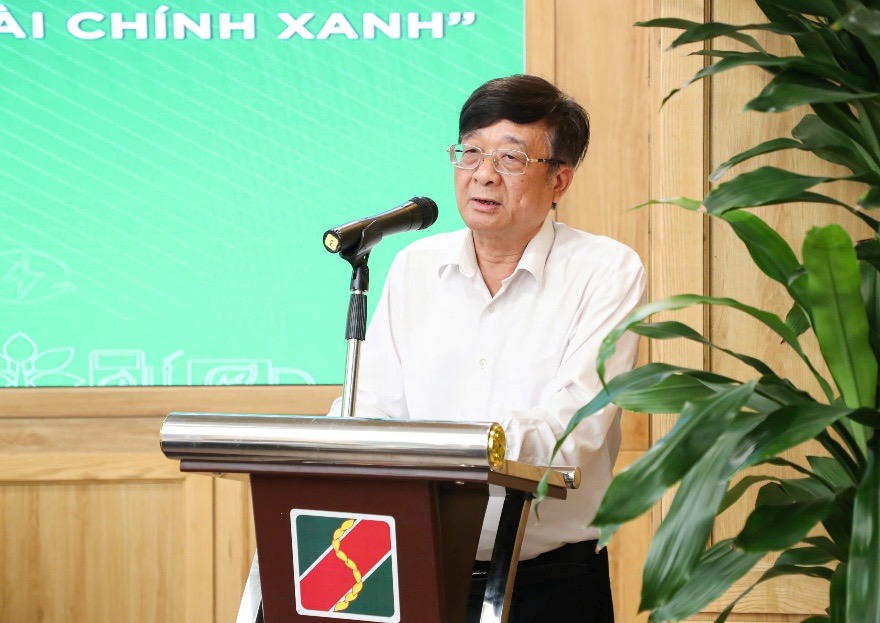
The banking industry is one of the leading units in achieving this goal, Mr. Nguyen Quoc Hung emphasized that the State Bank has proactively published a Handbook guiding the environmental - social risk management system (ESMS) in credit granting activities. Credit institutions (CIs) have identified the important role of credit capital in implementing the National Green Growth Strategy and focusing on investing capital in the green finance sector. The credit institutions have been very proactive in coordinating, creating conditions and investing capital for businesses to invest in areas that ensure environmental safety. In the past 10 years, the banking industry has recorded many positive results in green growth.
As the main capital channel of the economy, banks and credit institutions have great potential in orienting capital flows into priority areas for green development, from renewable energy, sustainable agriculture, to energy-saving and waste treatment projects. By the end of March 2025, 58 credit institutions had outstanding green credit with outstanding loans reaching over VND 704,244 billion, an increase of 3.57% compared to the end of 2024, accounting for 4.3% of total outstanding loans in the entire economy. The average growth rate of green credit balance reached more than 21.2%/year in the period 2017-2024, higher than the credit growth rate of the entire economy. The active participation of credit institutions has created a spillover effect, encouraging businesses and the community to join hands to protect the environment.
However, Mr. Nguyen Quoc Hung also said that the process of implementing the development of the green financial market in Vietnam still faces many barriers. One of the biggest barriers and challenges at present is that the legal framework is not really synchronous and complete.
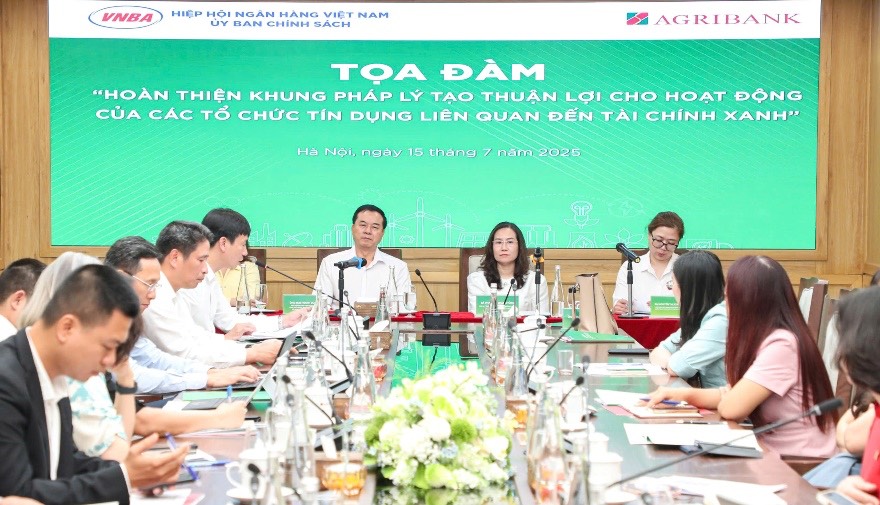
The seminar focused on clarifying the specific impacts of not being synchronous and perfecting the legal corridor related to green finance, which hinders the development of green credit, issuing green bonds, green growth and sustainable development of credit institutions; at the same time, making specific recommendations to the Government, management agencies, localities and businesses to promptly remove and resolve the issue so that green finance in general and green credit in particular can develop commensurate with the potential and advantages, effectively and successfully contributing to the green growth and sustainable development goals of the country that Vietnam has set.
At the seminar, representatives of participating banks proposed three groups of important solutions to remove obstacles and promote green credit.
First, it is necessary to improve the legal framework and financial incentives to facilitate credit institutions in implementing green credit. Specifically, the State should promptly issue detailed instructions for implementing Decision No. 21 on green project classification, and at the same time apply policies to exempt or reduce corporate income tax on income from green lending activities. In addition, there should be a mechanism to provide interest rate compensation or interest subsidy to reduce loan costs for green, organic or circular agricultural projects.
Second, there should be clear incentive policies for pioneering credit institutions in implementing green credit. Specifically, the State Bank can consider reducing the reserve requirement ratio or refinancing interest rates for banks with a high green credit ratio, thereby creating substantial financial incentives for banks to shift their credit portfolios towards greening.
Third, the State Bank needs to soon issue guidelines on social risk management in credit granting activities. The development of a set of social risk criteria according to international practices will be the foundation for credit institutions to complete the environmental - social risk management system, while meeting the requirements of international financial institutions in receiving funding and entrusting investment in green projects.
Fourth, it is necessary to build a centralized database on environmental and social risk assessment and have mechanisms and policies for credit institutions to make the most of this data source.
Agribank accompanies the national strategy on green growth
As a leading state-owned commercial bank, with the mission of focusing on serving "Three Farms", Agribank has been affirming its pioneering role in implementing green credit programs, contributing to spreading banking capital to environmentally friendly areas, protecting the ecosystem and promoting green, clean and modern agriculture.
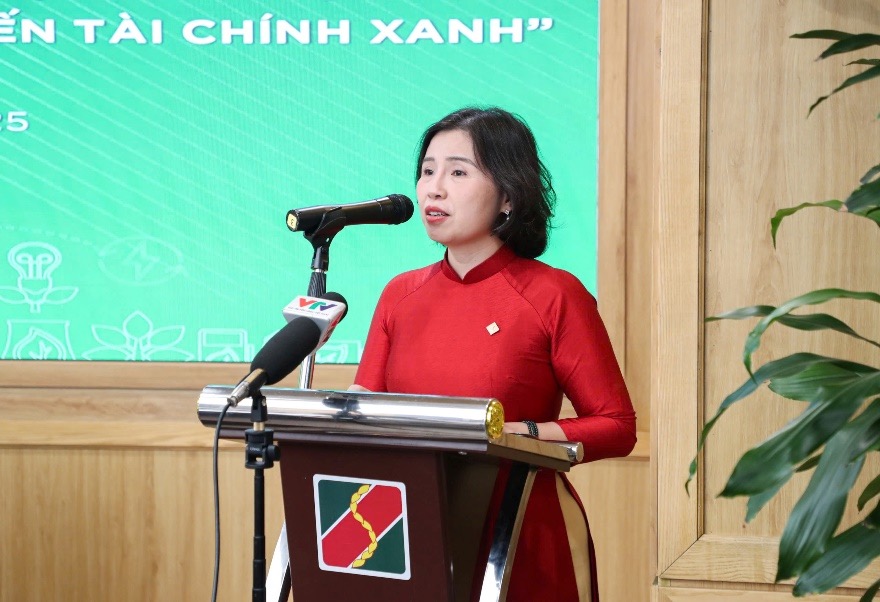
Since 2016, Agribank has been at the forefront of implementing the Loan Program to encourage the development of high-tech agriculture, clean agriculture, with a minimum capital of up to VND50,000 billion. This is a program for businesses, cooperatives, cooperative unions, farm owners... to participate in stages in the large-scale production chain of safe agricultural products. The highlight of the program is the preferential interest rate, reduced from 0.5% to 1.5%/year compared to the normal interest rate for the agricultural sector, helping customers reduce borrowing costs and improve investment efficiency.
At the same time, Agribank has implemented a preferential credit package of VND 2,000 billion to support individuals in the production and trading of OCOP products - National Program "One product for each commune". With interest rates at a maximum of 2%/year lower than Agribank's interest rate floor, the program not only enables OCOP entities but also contributes to the development of the rural economy associated with the conservation of indigenous values and sustainable development.
Agribank always clearly demonstrates its role as a companion to the Government's major strategies on green growth and emission reduction. Agribank has actively coordinated with the Ministry of Agriculture and Rural Development and the Ministry of Natural Resources and Environment in implementing key projects such as: Piloting project to build a standard agricultural and forestry material area for domestic consumption and export in the period of 2022-2025; Sustainable development project of 1 million hectares of high-quality, low-emission rice cultivation in the Mekong Delta by 2030.
Agribank also strongly implements a "green credit" lending program exclusively for individual customers, with a scale of up to VND 10,000 billion. Customers can borrow capital with preferential interest rates from only 3.5%/year to implement plans and projects for production and trading of products and services in the green sector such as: organic agriculture, clean energy, environmentally friendly products... The program contributes to bringing green credit closer to people, creating conditions for the community to participate in the process of converting the growth model from breadth to depth, focusing on efficiency and sustainability.
In addition to programs for individual customers, Agribank actively cooperates with international financial institutions to implement large-scale and in-depth green projects, including: Project to improve the quality and safety of agricultural products and develop a bio- gas program; coastal resource projects for sustainable development; disaster risk management; support low-carbon agriculture; clean water supply and sanitation in rural areas of the Red River Delta; renewable energy development projects such as wind power, solar power; Anti- drought and salinity programs in the Mekong Delta and the Central - Central Highlands... These projects not only help increase climate change adaptation capacity but also contribute to promoting sustainable livelihoods for millions of people in disadvantaged areas.
In recent years, green credit at Agribank has recorded stable growth. The proportion of green-sector lending balance over Agribank's total credit balance increased from 0.9% in 2020 to 1.7% in 2024 - a clear step forward in the current green credit market. In 2024 alone, Agribank has provided green credit to more than 42,000 customers, with a total outstanding loan balance of nearly VND29,000 billion, of which: renewable energy and clean energy: More than VND15,000 billion, accounting for 53%; Sustainable forestry sector: Over VND6,900 billion, accounting for nearly 24%; Green agriculture sector: Nearly VND6,500 billion, accounting for more than 22%. Agribank continues to be the leading bank in the number of customers granted credit in the green sector.
For Agribank, green credit is not only a bridge connecting the bank with farmers, businesses, communities and domestic and international development organizations; it is also a joint effort to realize commitments to protect the environment, adapt to climate change, develop circular agriculture and improve the quality of life for people.


